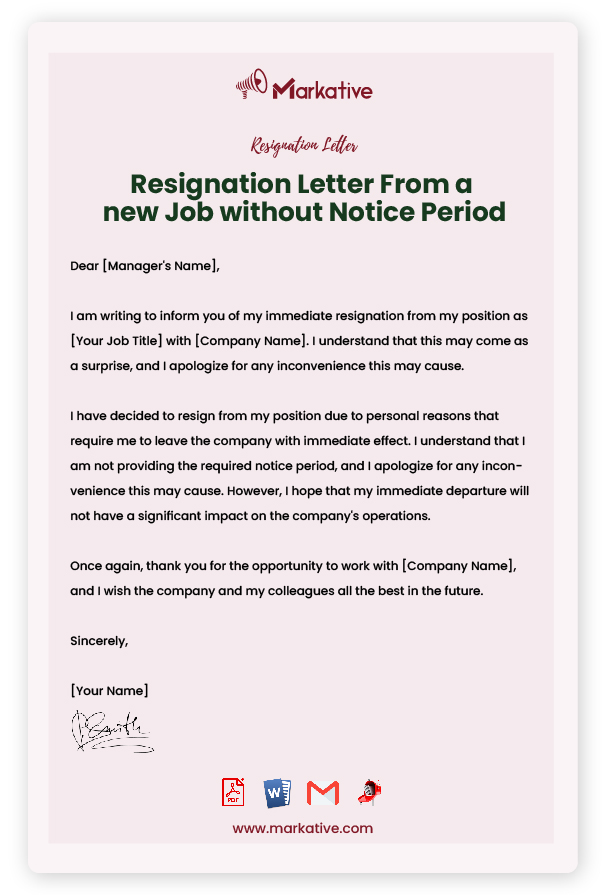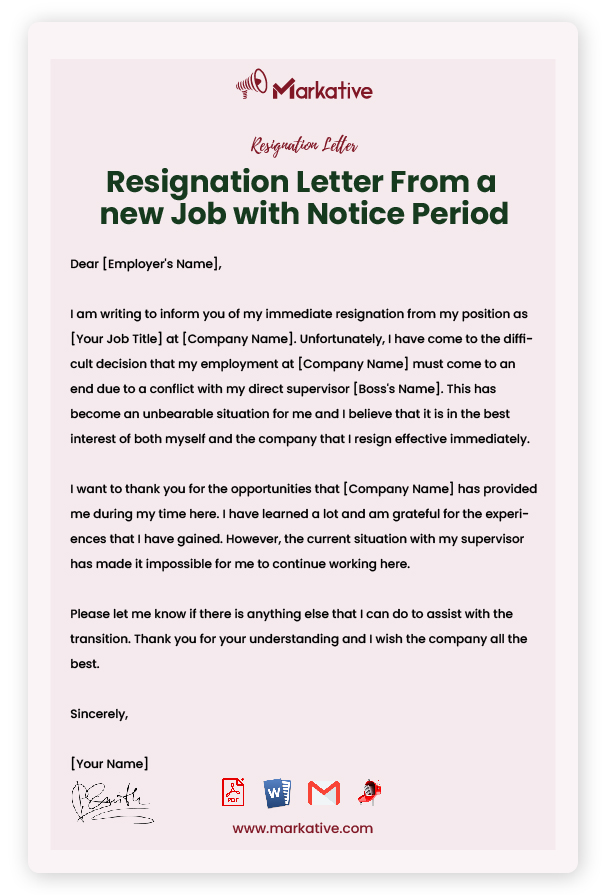A resignation letter is a formal document that notifies an employer of an employee’s intention to leave their position. While it may seem like a small formality, resigning from a new job can have a significant impact on one’s career and professional reputation. In this article, we will discuss why resignation is important, how a good resignation can create a positive impact, and provide tips on crafting a well-written Resignation Letter From a new Job.
Resignation is an important aspect of professional conduct as it demonstrates respect for the employer, colleagues, and the organization as a whole. A resignation letter serves as a formal record of the employee’s departure, which can help prevent misunderstandings or disputes in the future. Furthermore, it is a professional and courteous gesture that can leave a lasting impression on the employer, and can potentially lead to future employment opportunities.
Crafting a well-written resignation letter can also have a significant impact on one’s professional reputation. A good resignation letter should be clear, concise, and respectful, while also expressing gratitude for the opportunity to work with the organization. It can demonstrate professionalism, strong communication skills, and a willingness to leave on good terms, which can be beneficial for future job prospects. In contrast, a poorly written or unprofessional resignation letter can damage one’s reputation and potentially harm future employment opportunities.
Are you planning to resign from your new job but unsure of how to do it properly? In this article, we will guide you through the importance of resignation, the impact of a good Resignation Letter From a new Job, and provide tips on how to write a well-crafted resignation letter that leaves a positive impression.
How To Write Appealing Resignation Letter From a new Job?
Writing an appealing resignation letter is essential to leave your new job on a positive note. Here are five steps to help you write an effective resignation letter.
- Start with a clear statement: Begin your letter by stating your intention to resign and the effective date of your resignation. This sets the tone for the rest of the letter.
Example: “Dear [Manager’s Name], I am writing to inform you that I have decided to resign from my position as [Your Job Title] at [Company Name], effective [Date].”
- Express gratitude: Thank your employer for the opportunities and experiences you gained during your employment. This shows appreciation and leaves a positive impression.
Example: “I want to express my sincere gratitude for the opportunities I have been given during my time at [Company Name]. It has been a pleasure to work alongside such a talented and supportive team.”
- Provide a brief reason: Keep your reason for leaving concise and professional. This can include personal reasons, a better job opportunity, or career growth.
Example: “After much consideration, I have decided to pursue a new career opportunity that aligns with my long-term goals.”
- Offer assistance: Offer to assist in the transition process, such as training a replacement or finishing outstanding projects. This demonstrates your commitment to the company’s success.
Example: “I am committed to making the transition process as smooth as possible and am willing to help train my replacement and finish any outstanding projects.”
- End on a positive note: End your letter with well wishes and a positive tone. This will leave a lasting impression and maintain a professional relationship.
Example: “Once again, thank you for the wonderful experience and opportunities. I wish you and the team all the best in the future.”
Conclusion: Writing a resignation letter is a professional way to inform your employer of your departure. By following these five steps, you can create an appealing resignation letter that leaves a positive impression and maintains a professional relationship.

Resignation Letter From a new Job with Notice Period
Dear [Manager's Name], I am writing to inform you of my resignation from my position as [Your Job Title] at [Company Name]. I have accepted an offer for another opportunity that aligns more closely with my career goals and aspirations. I would like to give you the customary notice period of [Notice Period], as outlined in my contract. My last day of work will be [Date], which is [Notice Period] days from today. I will do my utmost to ensure a smooth and seamless transition during this time and assist with any handover or training that may be necessary. I appreciate the opportunities and experiences that I have gained during my time at [Company Name]. I am grateful for the support and guidance provided by you and the rest of the team, which has enabled me to grow both professionally and personally. Please let me know if there are any specific tasks or projects that you would like me to focus on during this notice period. Additionally, I am happy to discuss any other aspects of my resignation or the handover process. Thank you again for the support and opportunities that you have provided me. I wish the company and my colleagues all the best for the future. Sincerely, [Your Name]
Resignation Letter From a new Job without Notice Period
[Your Name] [Your Address] [City, State ZIP Code] [Email Address] [Date] [Manager's Name] [Company Name] [Address] [City, State ZIP Code] Dear [Manager's Name], I am writing to inform you of my immediate resignation from my position as [Your Job Title] with [Company Name]. I understand that this may come as a surprise, and I apologize for any inconvenience this may cause. I have decided to resign from my position due to personal reasons that require me to leave the company with immediate effect. I understand that I am not providing the required notice period, and I apologize for any inconvenience this may cause. However, I hope that my immediate departure will not have a significant impact on the company's operations. I appreciate the opportunity that you and the company have given me, and I have enjoyed working here. I would like to thank you and the rest of the management team for your support, guidance, and encouragement during my time here. I am grateful for the experience and the lessons learned, which I will carry with me throughout my career. Please let me know if there is anything I can do to facilitate a smooth transition process. I will ensure that I complete all my pending tasks before my last working day, which will be [Date of Last Working Day]. Once again, thank you for the opportunity to work with [Company Name], and I wish the company and my colleagues all the best in the future. Sincerely, [Your Name]
Resignation Letter From a new Job with Reason
Dear [Manager's Name], I am writing to inform you that I have decided to resign from my position as [Your Job Title] at [Company Name], effective [Date of Resignation]. This decision has not been an easy one, but after careful consideration, I have come to the conclusion that this is the best course of action for me. The reason for my resignation is that I have received an offer from another company that I believe presents a unique opportunity for my personal and professional growth. I want to express my gratitude for the opportunity to work with such an amazing team and learn from you during my time here at [Company Name]. I have enjoyed my time here and appreciate everything that you and the company have done for me. I am committed to ensuring a smooth transition during this period. I will work diligently to complete all of my outstanding assignments, assist with the transition of my responsibilities to my successor, and ensure that all of my projects are handed over effectively. Thank you again for the opportunity to work with you and the team at [Company Name]. I have learned a great deal during my time here and will always cherish the experience. Sincerely, [Your Name]
Resignation Letter From a new Job without Reason
Dear [Manager's Name], I regret to inform you that I have decided to resign from my position at [Company Name], effective [Date of Resignation]. While I have enjoyed my time at the company, I have decided to move on to other opportunities. I understand that my resignation may come as a surprise, and for that, I apologize. I want to assure you that my decision was not an easy one to make, but I believe it is the best one for me at this time. I want to thank you and the rest of the team for the support and guidance that you have provided me during my time here. I appreciate the experience and skills that I have gained, and I will always be grateful for the opportunities that the company has provided me. I will do everything in my power to ensure a smooth transition and will work with you to ensure that all of my current projects are completed and that there is no disruption to the team's work. Once again, I apologize for any inconvenience this may cause and thank you for your understanding. Sincerely, [Your Name]
Urgent Resignation Letter From a new Job Sample
[Your Name] [Your Address] [City, State ZIP Code] [Your Email Address] [Today's Date] [Employer's Name] [Employer's Address] [City, State ZIP Code] Dear [Employer's Name], I regret to inform you that I am resigning from my position as [Job Title] at [Company Name], effective immediately. This was not an easy decision for me to make, but due to unforeseen circumstances, I must resign from my position. I appreciate the opportunity that [Company Name] has provided me to work with a team of skilled professionals, and I am grateful for the knowledge and skills that I have gained during my brief stint here. The support that I received from my colleagues and superiors has been invaluable, and I am thankful for the same. I understand that my resignation may cause inconvenience to the company, and I am willing to do everything possible to ensure a smooth transition. I will complete any pending assignments that I have and will make sure that all my work is up-to-date before I leave. I will be available to answer any questions or concerns that you may have regarding my work or the transition process. Please let me know if there is anything else that I can do to help. Thank you again for the opportunity to work at [Company Name]. I hope that we can stay in touch, and I wish the company continued success in the future. Sincerely, [Your Name]
How Much Notice Should You Give for a Resignation Letter From a new Job?
According to the Bureau of Labor Statistics, the median employee tenure in the United States was 4.1 years in January 2020. This means that the average American worker stays with their employer for just over four years. However, this number varies greatly depending on the industry and job type. For example, employees in management and professional occupations tend to stay with their employers for longer than those in service occupations.
When it comes to giving notice for a resignation letter from a new job, it’s important to check your employment contract or offer letter for any specific guidelines. In general, it’s considered courteous to give at least two weeks’ notice, but some companies may require more or less notice depending on the position and level of responsibility. Giving sufficient notice can help ensure a smooth transition for your employer and colleagues, and may also impact your eligibility for rehire in the future. It’s always a good idea to have a conversation with your supervisor or HR representative to discuss your resignation and the appropriate amount of notice.

Is it Ok To Email a Resignation Letter From a new Job?
It is generally acceptable to email a resignation letter from a new job, but it is important to ensure that the email is professional and courteous. It is also recommended to follow up with a phone call or in-person conversation to further discuss the resignation and any necessary details. Here is an example:
Dear [Manager's Name], I am writing to inform you that I have accepted a new job opportunity and will be resigning from my position as [Your Current Position] at [Company Name]. I have greatly appreciated the opportunities and experiences I have had while working here and will always cherish the memories. Please let me know if there is anything I can do to ensure a smooth transition during my remaining time here. I am committed to wrapping up my current projects and training my replacement to the best of my abilities. Thank you for the support and guidance you have provided throughout my time here. Sincerely, [Your Name]
Common Mistakes When Writing a Resignation Letter From a new Job?
- Being too negative: It’s important to keep a positive tone in your resignation letter, even if you are leaving your new job due to negative circumstances. Avoid blaming or criticizing anyone, and focus on the positive experiences you had during your brief tenure.
- Not giving enough notice: Check your employment contract or company policy to see how much notice you need to give before resigning. If possible, give your employer more notice than required to allow them time to find a replacement.
- Not expressing gratitude: It’s important to thank your employer for the opportunity to work at the company, even if it wasn’t the right fit for you. Show gratitude for the skills you gained, the experiences you had, and the relationships you formed while working there.
Conclusion:
writing a resignation letter is an important step when leaving a job, even if it’s a new one. It’s important to consider the appropriate timing and method of delivery, as well as the content and tone of the letter. Common mistakes to avoid include being overly negative or emotional, failing to express gratitude, and providing too much or too little detail. Fortunately, there are many free and readily available templates online that can help make the process easier and more straightforward. By following best practices and using available resources, you can ensure that your resignation letter is professional, courteous, and effective in communicating your departure to your employer.







